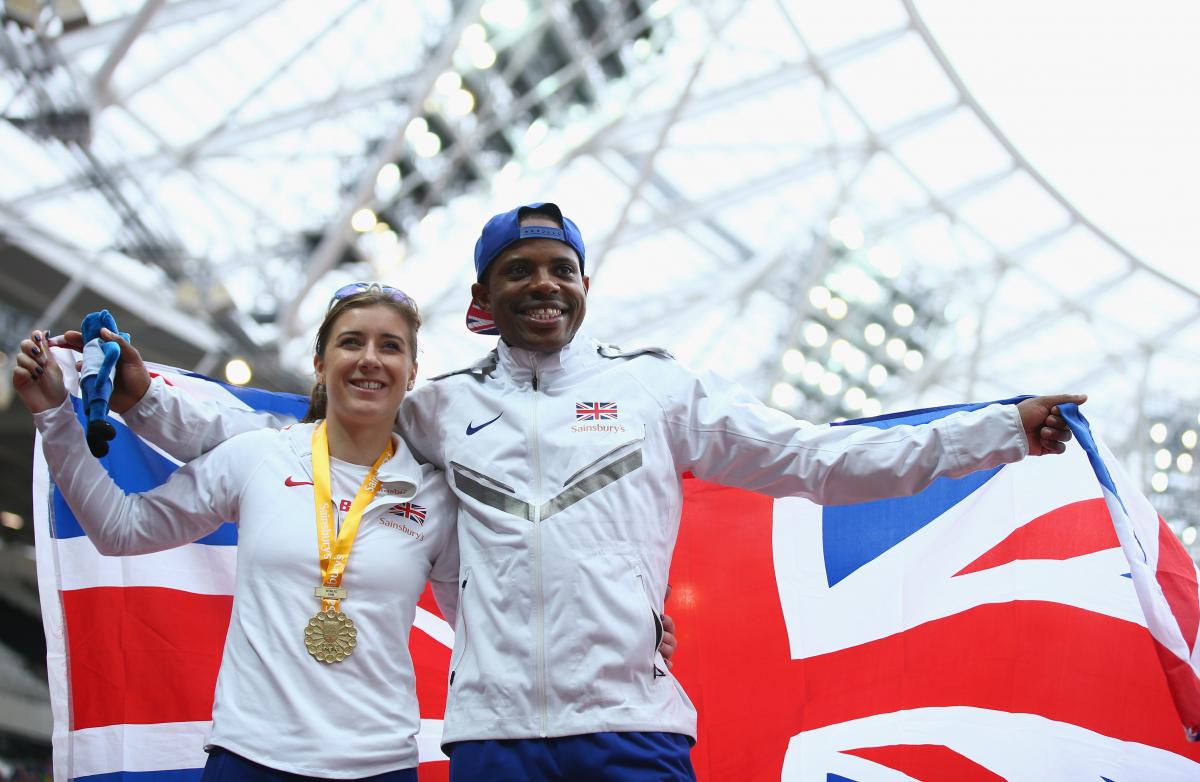New guide runner database launched
England Athletics and British Blind Sport have joined forces to get more people with visual impairments into running. 29 Mar 2016
Libby Clegg of Great Britain and her guide celebrate after winning the women's 200m T12 race during the IPC Grand Prix Final at the London 2012 Olympic Stadium
"I find being a guide so rewarding as any events that I undertake with Iris are about helping her to succeed."
England Athletics and British Blind Sport have launched ‘Find a Guide’, a national guide runner database to support more people with a visual impairment to run.
The database is an online tool for anyone aged 18-years or older with a visual impairment in England, whether they have never run before, are a gym-goer looking to take their running outdoors or a seasoned runner looking for a new guide. It will enable visually impaired people to go for a run on their own, join a club or running group or take part in an event or race.
The database is live at England Athletics’ website.
The simple search function within the database allows users to search for a guide runner in their local area. All guide runners on the database are licenced which means they are DBS checked and have attended an England Athletics ‘Sight Loss Awareness and Guide Running’ workshop.
The launch of the Find a Guide Database is part of a national drive by England Athletics and British Blind Sport to support more visually impaired people to get active through running by putting them in touch with trained guide runners in their local area. There are currently 112 guide runners registered on the database across England, in particular guide runners are available in Cambridgeshire, Gloucestershire Leicestershire, London, Nottingham, Hampshire and South Yorkshire.
Nick Thorley is a visually impaired runner from Nottingham who runs with an England Athletics licenced guide: “Running has become a massive part of my life. It gives me a focus, makes me feel healthier, has increased my confidence and provides a real sense of achievement. It’s the generosity and commitment of guide runners that makes all this possible. Strangely, I find running with someone gives me more of a sense of freedom and independence than anything else I’ve done.”
Over the next 12 months England Athletics and British Blind Sport are working with various partners and running clubs and groups across England to find and train more guide runners so that there are guides in all areas of the country. If you are interested in becoming a guide runner visit England Athletic’s website.
Wendy Lawson is from Redhill Road Runners in Nottingham and is a guide runner for a visually impaired runner called Iris: “I find being a guide so rewarding as any events that I undertake with Iris are about helping her to succeed. I love the bond that Iris and I have, we always fall into step with each other she is a great friend and not just someone who I guide.
“I love the feeling that I can 'give something back' to a sport that I came into in my 40s. Members of my own club gave up their own running time to bring my running on. I like to think that I'm giving it back via my Run Leader Licence and guide running with Iris.”
The need for the database has been highlighted by latest figures from Sport England’s Active People Survey 9, December 2015, which show that only 11.8 per cent of adults with a visual impairment take part in sport once a week, compared to 39.3 per cent of sighted adults. England Athletics and British Blind Sport hope the new database will encourage more visually impaired adults to access the support they need to take up running or enjoy more frequent runs.
Join the conversation on social media using #FindAGuideAndRun.

 Facebook
Facebook
 Instagram
Instagram
 Twitter
Twitter
 Youtube
Youtube
